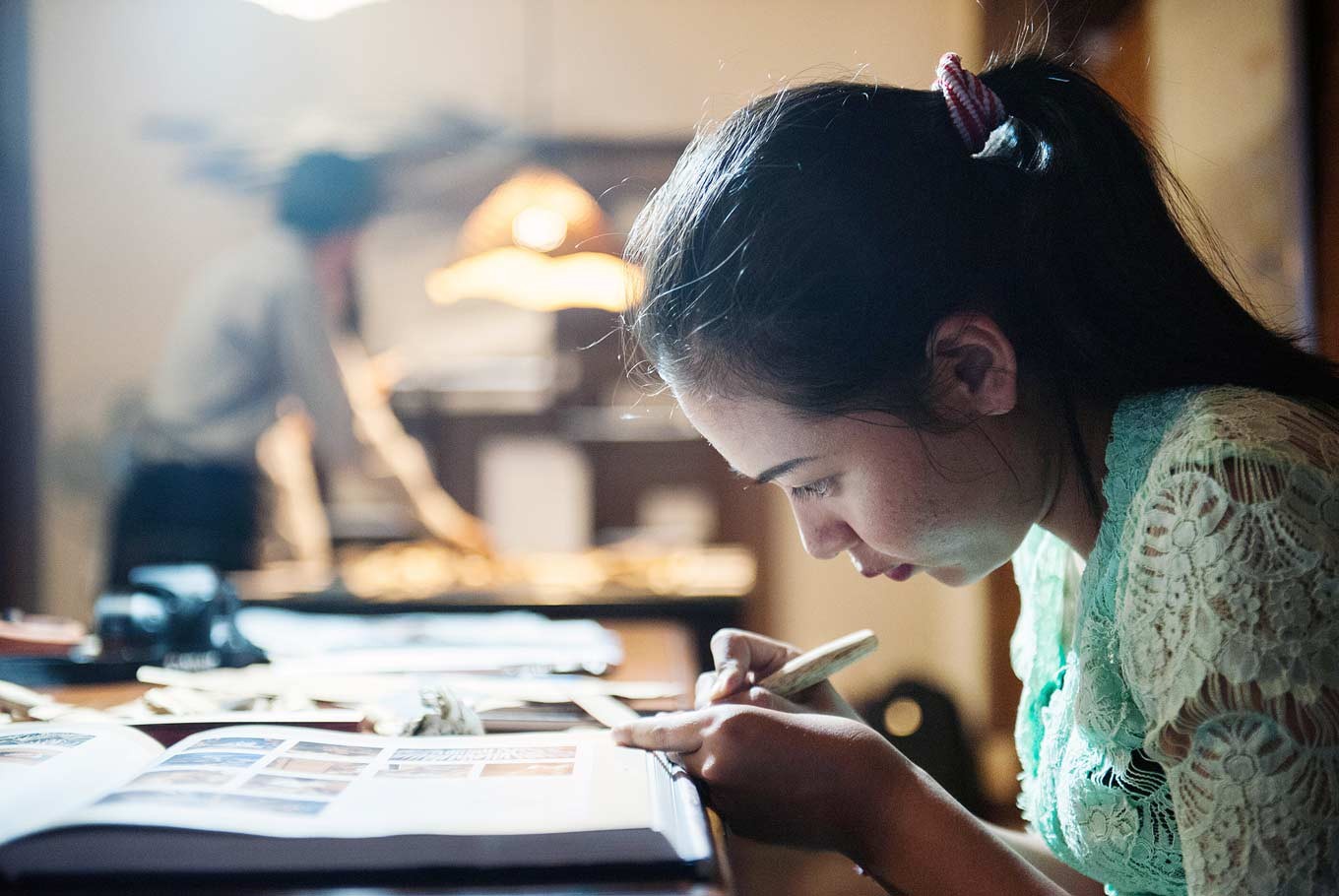UWRF to return as a platform for contemporary dialog
The upcoming Ubud Writers and Readers Festival will enter its 15th edition this year, bringing more than 150 speakers from 25 countries to Bali.
Change Size
 Preserving culture: Citra writes Balinese script on a lontar (palm leaf) during a Lontar exhibition at Ubud Writers and Readers Festival 2016. (JP/Anggara Mahendra)
Preserving culture: Citra writes Balinese script on a lontar (palm leaf) during a Lontar exhibition at Ubud Writers and Readers Festival 2016. (JP/Anggara Mahendra)
T
he annual Ubud Writers and Readers Festival (UWRF), which will run from Oct. 24 to 28 in Ubud, Bali, seeks to maintain socio-political relevance for its 15th edition this year.
The festival will highlight several pressing issues of our contemporary times — from gender, migration and diversity to disaster management and environmental problems.
UWRF founder and director Janet DeNeefe said the theme of this year’s festival was “Jagadhita” (The World We Create), the Balinese Hindu philosophy of people pursuing universal harmony and prosperity as their individual life’s goal.
The speakers, she said, had been selected to represent local and global cultural diversity, arriving in Bali to share their extraordinary stories and unique perspectives with the audience.
“We strive to bring together a diverse mix of speakers, the most interesting way we know to showcase many perspectives regarding the same issues,” DeNeefe told The Jakarta Post.
Discussions about gender-based violence, for instance, will feature acclaimed Indian poet, novelist and dancer Tishani Doshi, who addresses domestic violence in her work, alongside Indonesian writer-filmmaker Djenar Maesa Ayu, well-known for her women-focused work.
Read also: Reni Eddo-Lodge: Sticking around to talk about race
Pakistani author Fatima Bhutto will also return to Ubud since her first appearance at the festival in 2008. The niece of slain Pakistani politician Benazir Bhutto, who twice served as prime minister, is a fierce critic of her charismatic aunt, claiming she was power hungry and “morally responsible” for the murder of her own brother — the writer’s father.
On the issue of migration and diversity, the upcoming festival’s speakers will include Nigerian-American writer, filmmaker and medical doctor Uzodinma Iweala, who is the CEO of the Africa Center in New York. The Africa Center seeks to promote a new narrative about Africa and its diaspora through culture, policy and business.
Other featured speakers who will discuss diversity and migration include author Haidar Bagir, who promotes pluralism and progressive Islamic thought through interfaith dialogue; and British playwright, screenwriter, filmmaker and novelist Hanif Kureishi, who will appear alongside former Australian Human Rights Commission president Gillian Triggs, who launched an inquiry into the detention of child immigrants.
Ndaba Mandela, a rights activist from Johannesburg, South Africa and grandson of the iconic freedom fighter Nelson Mandela, is also set to attend the festival.
Environmental issues will also be under the spotlight at the festival, with speakers including Fisheries and Maritime Affairs Minister Susi Pudjiastuti, Greenpeace Southeast Asia executive director Yeb Saño and activist Emmanuela Shinta, who defends the rights of the indigenous Dayak people in Kalimantan.
A panel on disaster management will feature Indonesian seismologist Devy Kamil Syahbana, photographer Rio Helmi, activist Ade Andreawan, Japanese artist Daisuke Takeya and Australian journalist Jewel Topsfield, whose lives are closely tied to the issue.
“Over the years, our programs get more diverse. For instance, we have included Indonesian films as a big chunk of our program [this year],” DeNeefe said.
The festival will also honor Indonesian filmmakers, such as Richard Oh, who will premiere his fifth film Love is a Bird at the event, as well as Kamila Andini, the director of 2017’s award-winning Sekala Niskala (The Seen and Unseen).
DeNeefe said she felt Indonesians were learning to have a sense of ownership over the festival as well. “Recently, we have been seeing around a 50 percent increase of Indonesians among the audience and with the recent growth, we project that our Indonesian audience will grow 50 percent bigger in another five years,” she says.
The festival’s organizer was also praised for its success in bringing in prominent international authors, which was not an easy task to accomplish.
“These [prominent] writers know we’re really a grassroots festival, of real people trying to make a real difference,” DeNeefe humbly explained the festival’s success in featuring big names in its programs.
Indonesian novelist and journalist Leila S. Chudori, who will also appear at this year’s festival, said she was not only impressed by the festival’s success in bringing in prominent international authors but was equally impressed by the festival’s audience as well.
“We can tell that the audience members are avid readers by the quality of their questions [during panel discussions],” Leila told the Post.
Veteran poet Sapardi Djoko Damono, also featured in the upcoming UWRF 2018, said the festival’s creative and intellectual atmosphere could motivate Indonesian writers to further improve the quality of their works.
“[To sharpen their skills] Indonesian writers must communicate and form networks [with their international counterparts] during the festival,” Sapardi said.









